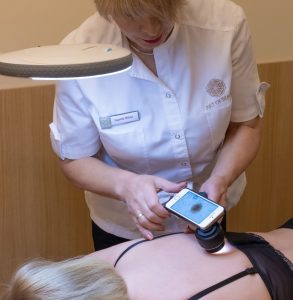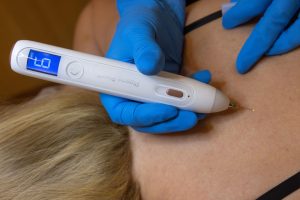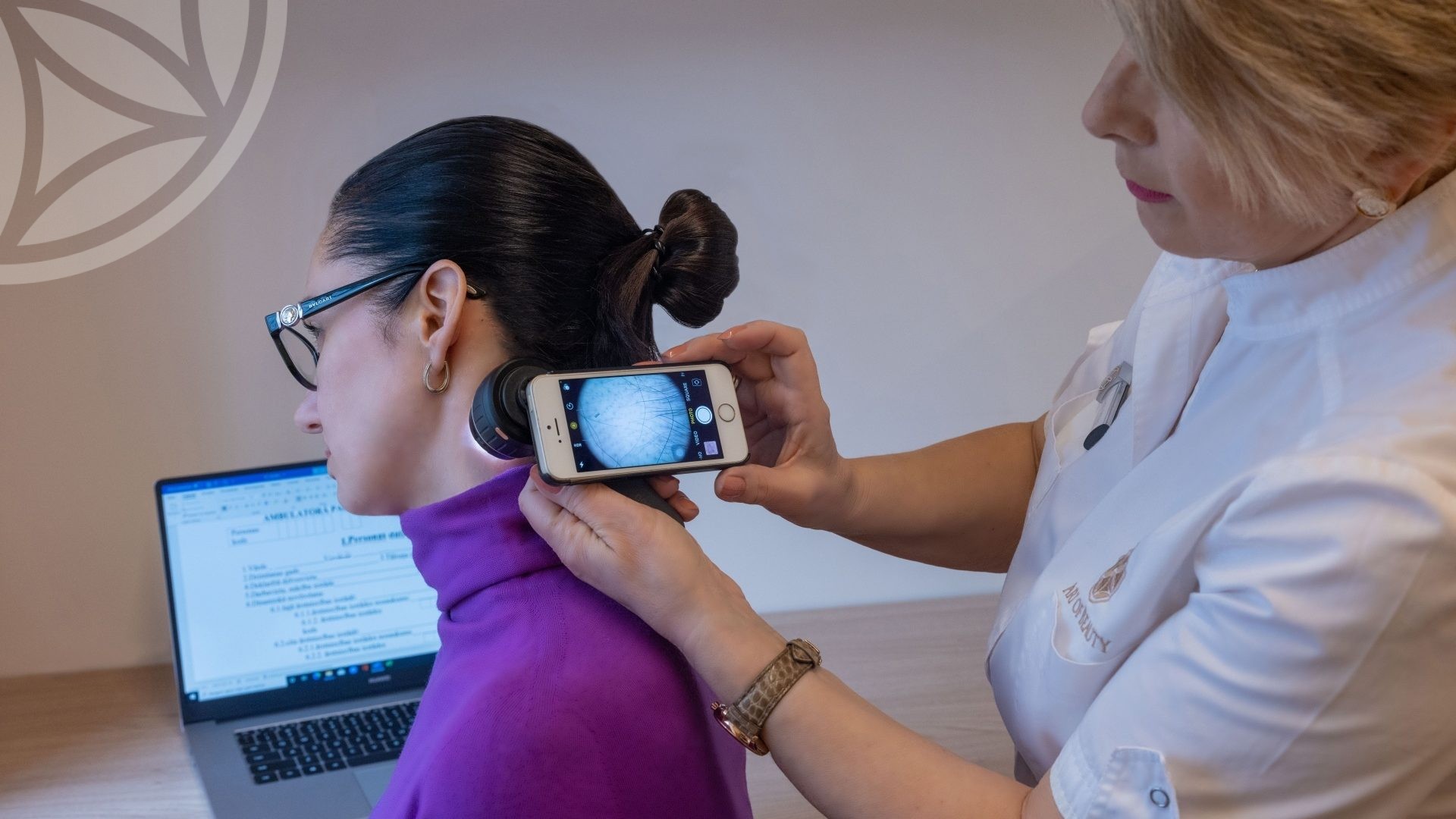Dermatovenerology
Dermatovenerology studies the structure and function of the body’s skin, deals with the problems of diagnosis and treatment of skin diseases, as well as sexually transmitted infections.
Modern dermatovenerology aggregates two specialized disciplines: dermatology and venereology.
A dermatovenerologist is engaged in the identification and selection of therapy for skin diseases, sebaceous glands, diagnosis and treatment of sexually transmitted diseases, symptoms and possible complications developing against the background of these diseases and concomitant correction of immunity.

At the reception of a dermatovenerologist
- Diagnosis and therapy of skin diseases of various genesis
- Early diagnosis of skin neoplasms and moles
- Treatment of sexually transmitted diseases (STD) (diagnosis and treatment of sexually transmitted infections)
- Removal of benign skin formations, warts, contagious mollusc
- Destruction of candylomas in the anogenital zone of men and women with subsequent treatment
- Diagnosis and therapy of nail diseases
- Diagnosis and therapy of hair loss
For early, accurate and objective diagnosis of skin diseases and skin formations, an apporatno-diagnostic method is used – dermatoscopy: an optical method for visualizing skin structures, skin appendages and mucous membranes using a dermatoscope using polarized light and a filter system under magnification to examine the underlying elements of the structure of the skin and mucous membranes in order to clarify the diagnosis and early diagnosis malignant neoplasms of the skin.

The dermatoscopy method is included in the examination of each patient


The reason for contacting a dermatovenerologist may be:
- Redness on the skin
- Itchy skin
- The appearance of age spots
- The appearance of various rashes
The main symptoms that require consultation with a dermatovenerologist:
- The appearance of rashes, spots, purulent bubbles on the skin.
- Severe itching with the appearance of rash and redness at the place of combing.
- The appearance of peeling on the skin.
- The appearance of papillomas, warts, moles.
- Hair loss, dandruff, a peeling crust appeared on the scalp.
- The color of the nails has changed, the nail plates have become layered, deformed.
- Unprotected sex, uncertainty about the health of a sexual partner.
- The appearance of candylomas in the genital area.
- Discharge with an unpleasant odor from the external genitals.
- Painful sensations when urinating.
- There was itching and burning of the external genitals.
Diseases belong to dermatovenerological:
Pustular diseases
- Folliculitis, carbuncles, boils
- Erysipelas of the skin
- Streptococcal and staphylococcal infections
Viral diseases
- Herpes
- Contagious mollusc
Papillomavirus diseases
- Warts
- Birthmark
- Moles
- Papillomas
- Benign neoplasms
Diseases of the hairline
- Seborrhea
- Acne
Chronic skin diseases
- Psoriasis
- Neurodermatosis
- Dermatitis
- Eczema
Fungal diseases
- Lichen
- Candidiasis
- Mycosis
Parasitic diseases
- Pediculosis
- Scabies
Sexually transmitted diseases
- Syphilis
- Gonorrhea
- Trichomoniasis
- Chlamydia
- Ureaplasmosis
- Mycoplasmosis
- Candidiasis
- Anogenital candylomas
Important:
If a sexual infection is suspected, special attention is paid to the nature of secretions from the genitals, changes in the act of urination, the appearance of pain in the lower abdomen. It is important to take into account all sexual relations that preceded the disease and be sure to be examined after the infection is detected in the sexual partner.
Very often, venereal diseases have a blurred picture, are asymptomatic, therefore, if even the slightest suspicion of the disease appears, you should consult a doctor so that he prescribes an appropriate examination, and after diagnosis prescribes a course of effective therapy.
What is dermatoscopy?
This is a modern hardware method for studying the structures of the skin, skin appendages and mucous membranes, which allows you to examine in detail the color and microstructures of different layers of the skin – the epidermis, dermo-epidermal junction, papillary dermis.
What is the treatment of sexually transmitted disease (STD)?
Diagnostics (laboratory determination) of a specific disease is performed and an appropriate course of drug treatment is prescribed.
Consultation and all manipulations are carried out:

Dr.Ingrida Ritina
Dr.Ingrida Ritina

Dermotovenerologist
Ingrida Ritina is a certified dermatovenerologist with 20 years of experience
- A certified specialist in working with various hardware-laser techniques.
- A certified specialist in the field of aesthetic medicine.
- Member of the Latvian Association of Dermatovenerologists (LDVA).
- Head of the Latvian Society of Dermascopy.
- Member of the Latvian Association for Anti-Aging Medicine.
- In the 1981 year graduated from the Riga Medical Institute, Faculty of Medicine, receiving a doctor’s degree.
Conducts an appointment on dermatology and venereology:
- Diagnosis and treatment of dermatological and sexually transmissible diseases.
- Diagnosis of skin neoplasms and moles.
- The dermatoscopy method is included in the examination of each patient.
- Removal of benign skin formations by various methods, including the destruction of candylomas in the anogenital zone of men and women with subsequent treatment.
- The list of manipulations includes a unique method of non-ablative surgery, especially in demand when removing benign skin neoplasms in the face, eyelids and other hard-to-reach areas of the body. The uniqueness of the method lies in its controllability, accuracy, without adverse effects on vision when removing neoplasms in the area of the ciliary edge of the eyelids and a fast healing process with minimal post-procedural traces.
Botulinum toxin injections. - Member of many professional medical associations.
- She has repeatedly participated in international conferences with reports.
Author of two publications in international medical journals:
- Acta Dermatovenerologica Alpina, Pannonica et Adriatica “ Plasma sublimation for the treatment of xanthelasma palpebrarum”, 2020.
- Bulletin of Dermatology and Venereology No.4 -2017. “Experience of removal of benign skin neoplasms in the cervical-facial region by plasma ablation”, 2017.

Dr.Alexandra Panteleeva
Dr.Alexandra Panteleeva

Dermotovenerologist
Dr.Alexandra Panteleeva is a certified dermatovenerologist.
Education
- 2017. graduated from Stradyn University of Riga, Faculty of Medicine.
- 2022. graduated from Stradyn University of Riga, residency in dermatovenerology.
- Member of the Latvian Association of Dermatovenerologists (LDVA).
- Member of the European Academy of Dermatology and Venereology (EADV).
- Member of the International Society of Dermatoscopy (IDS).
- Members of the Latvian Association for Anti-Aging Medicine.
- Certified specialist in working with various hardware and laser techniques.
- Certified specialist in the field of aesthetic medicine.
Regularly improves his knowledge by attending international and Latvian congresses of doctors – European Academy of Dermatology and Venereology Congress, World Congress of Dermoscopy, Congress of the Baltic Association of Dermatovenerologists and others.
The doctor advises children and adults on skin, nail and hair diseases by conducting:
- Research, treatment and prevention of acute and chronic skin diseases using local and systemic therapy (psoriasis, atopic dermatitis, lichen planus, acne, rosacea, perioral dermatitis, seborrheic dermatitis, etc.).
- Diagnosis and treatment of fungal diseases of the skin, nails and hair.
- Diagnosis of skin neoplasms and moles.
- Diagnosis and treatment of viral, bacterial and parasitic skin diseases.
- Optical dermatoscopy is the examination and dynamic observation of skin and mucous membrane formations. The dermatoscopy method is included in the examination of each patient.
- Removal of benign skin formations.
- According to the indications, a “punch” skin biopsy is performed to clarify the diagnosis of skin diseases in the atypical course of the disease, with the ineffectiveness of previous therapy.
- Provides recommendations for daily skin care.
Conducts a reception on venereology issues:
- Diagnosis and treatment of sexually transmitted diseases.
- Removal of benign skin formations by various methods, including the destruction of candylomas in the anogenital zone of men and women with subsequent treatment.
In his work, the doctor uses an individual approach to each patient, taking into account the wishes and capabilities of the patient, evaluates the results of treatment in a team with the patient. The specialist is fluent in Latvian, Russian and English.
Member of many professional medical associations.
The specialist is fluent in Latvian, Russian and English.




